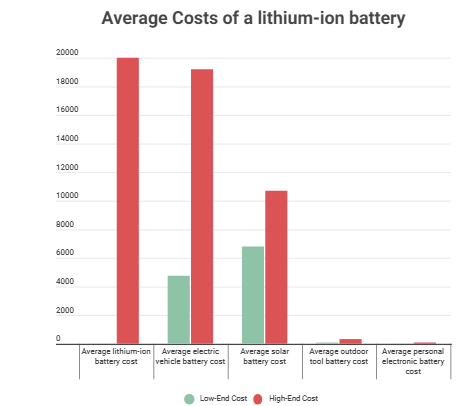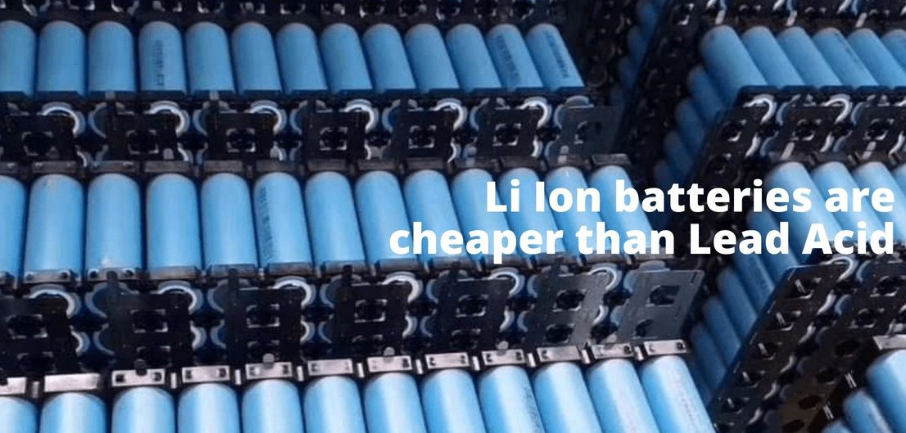
How Much Does Lithium Ion Batteries Cost?
How Much Does a Lithium Battery Cost in 2024?
Most lithium-ion batteries cost about $10 to $20,000, usually depending on various factors, including powered device, voltage, location and others. An average solar battery costs $6800-$10700. Because of the sudden concern about climate change, people are now more likely to be interested in solar battery technology.
Lithium-ion batteries are one of the best choices for clean and renewable energy. However, many consumers are searching for how much does lithium batteries cost in 2024, so we broke it down for you. So let’s have a look.
An Average Cost of a Lithium-ion Battery
We explored batteries on multiple platform units, including Amazon, Best Buy, and others, and studied financial data from administrative reports and news to find you the authentic lithium-ion battery prices. If you're looking for a low-cost battery with its full-fledged features, Innotinum is offering the best.
An average lithium-ion home solar storage battery costs about $6,800 to $10,700 (installation price is not included). These solar batteries are highly efficient for a solar energy system as they store extra energy that you can use during rainy or foggy climates (when the sun isn't shining). The more energy your solar batteries store, the less dependent you're on the grid, and their prices are also higher.
Cost of Lithium Ion Batteries Depend on Kilowatt-Hours
First, the question is, what is a Kilowatt-hour? A kilowatt is defined as a unit that calculates the electric energy consumption, while a kilowatt-hour is the energy that a 1-kW device uses in an hour.
Some studies report that an average lithium-ion battery costs nearly $151 per kWh. However, the overall costs of these batteries have shockingly decreased over the half-decade.
To measure the battery’s kWh, use the formula below:
KWh=Amp hours × Voltage ÷ 1000
Factors Affecting the Cost of Lithium Ion Batteries
The cost of Li-ion batteries depends on various factors. Some are mentioned below:
1.Voltage
The more power a battery stores, the higher it will cost. Therefore, lithium-ion batteries with higher voltage are highly expensive. Home storage solar batteries are often measured with kilowatt-hours, but other power tool batteries are less than one kWh and are measured in voltage and amp hours.
2.Amp hour
The more amp hours a solar battery has, the higher the durability of a device that operates on that single battery charge. A battery with 2 to 2.5 Amp hours may cost $110, but a battery with 10 to 12 Amp-hours comes with an average cost of $335.
3.Chemistry of Lithium Ion Battery
The price of lithium-ion batteries highly depends on their chemistry with other metals. For instance, batteries that contain semi-precious metals are highly expensive as compared to batteries made of cheaper raw materials.
Here, we describe the most trending types of lithium-ion batteries, as well as their use and costs.
Lithium Iron Phosphate (LFP): These batteries are mostly used for solar energy in electric scooters, RVs and boats. The average cost of an LFP battery is around $560, while most LFP batteries cost from $120 to $1950.
Lithium Nickel Manganese Cobalt Oxide (NMC): These lithium batteries are mostly used for electric power trains and other power tools and cost about 20% more than LFP batteries.
Lithium Titanate (LTO): Such batteries are highly expensive as they are mostly used for home solar storage, military equipment, electric vehicles and other aerospace.
Lithium Manganese Oxide (LMO): These batteries come at cheaper prices than LFPs and are commonly used in electric bikes and power tools. Some electric vehicles operate on LMOs.
Lithium Cobalt Oxide (LCO): The chemistry of lithium batteries is mostly used in laptops, cell phones, and digital cameras. And the cost is nearly $10-$90.
Lithium Nickel Cobalt Aluminum Oxide (NCA): These batteries usually cost the same as NMC and run in mostly electric cars like Teslas.
4.Location
Location is the most significant factor that can affect the price of lithium-ion batteries. The prices usually differ from country to country. China has the cheapest lithium-ion batteries, while the United States and Europe also have lowered the prices.
Why Lithium-ion Batteries are Cheaper than Lead Acid?
Homeowners have multiple battery choices for their solar panels. However, lithium-ion batteries and lead-acid batteries are the two most favourable options in terms of lifespan, efficiency, density, and cost.
But if you want to know why Li-ion batteries are less expensive than lead acid, Lifespan is the answer. Lithium-ion home storage batteries comparably show a higher productive lifespan of 10-15 years than others. At the same time, a lead acid battery costs thousands of bucks after 2-3 years. So, it is what makes lithium batteries highly cost-effective in the long run without the hassles of frequent installation.
How to Save Money When Buying Lithium-Ion Batteries
If you’re looking to purchase lithium-ion batteries without breaking the bank, consider these tips:
1. Assess Your Needs
Avoid overpaying for features or capacity you don’t require. For instance, if you’re setting up a small solar system, a 5 kWh battery might suffice.
2. Compare Brands
While premium brands offer unmatched quality, some lesser-known manufacturers provide solid performance at a lower price. Research reviews and specifications to find a balance between cost and quality.
3. Buy in Bulk
For industrial or commercial use, bulk purchases often come with discounts.
4. Monitor Market Trends
Prices for lithium-ion batteries have steadily decreased over the years due to advancements in technology and mass production. Keep an eye out for further price drops.
Where to Buy Lithium Ion Batteries at the Best Cost?
As we mentioned earlier, the cost of a lithium-ion battery depends on various factors, including its use, kWh, voltage, amp hour, battery type and location. So, if you are looking for affordable lithium-ion batteries for home storage, Innotinum is the best company to buy from. They not only offer budget-friendly but highly durable, scalable, efficient and environmentally-friendly lithium-ion batteries at surprising prices. So, make the change and place your order right now.
Conclusion
In short, lithium-ion batteries have shockingly revolutionized the electric market. These batteries are safe, a constant source of power, lightweight and highly eco-friendly. So avoid paying a high electricity bill and install lithium-ion home batteries in your home. No matter how expensive the lithium-ion batteries are, they are still cheaper than your annual electric bills. So choose the best for you and your home and make the decision accordingly.
Related blog: How Innotinum is Helping Customers with Cost-Friendly BESS?


